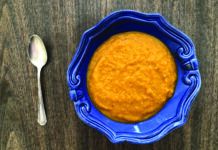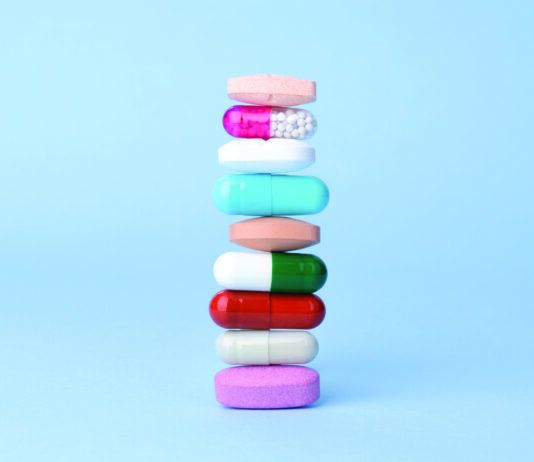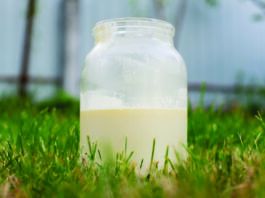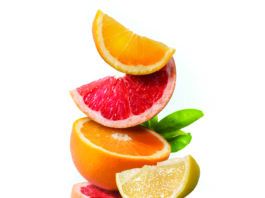Q. In purchasing frozen fruits and vegetables, does it matter how far the produce...
A. Alice H. Lichtenstein, DSc, Gershoff Professorof Nutrition Science and Policy at TuftsFriedman School, answers, To my knowledgethere are no data available on this topic.However, freeze/thawing cycles significantlydecrease the quality of the product. Hence,it is in the producers and purveyors interestto maintain high quality, and thus to avoidtemperature changes. The bottom line is thatproperly stored frozen fruits from other countriesshould be fine.…
Q. When considering the health benefits of peanuts, should they be viewed as legumes...
A. Jeffrey Blumberg, PhD, director of TuftsHNRCA Antioxidants Research Laboratory,replies: Though a legume by botanical classification,the nutrient profile of whole peanuts(including the skin) is more similar to tree nutsthan other legumes. For example, peanuts area good source of monounsaturated fat, niacinand vitamin E, and contain fiber, protein andminerals like magnesium and copper. Thoughmore fat calories may be absorbed from peanutbutter than from the matrix of the whole peanut,it too provides these healthful nutrientsexcept the antioxidant…
Q. I have raisins in my oatmeal every morning for breakfast, with milk. Now...
A. Diane McKay, PhD, a scientist in Tufts HNRCAAntioxidant Nutrition Laboratory, answers:The amount of iron in 1/4 cup of raisins is onlyabout 1 milligram, too little to interfere with theabsorption of the 300 milligrams of calcium presentin 1 cup of milk. If anything, the amount ofcalcium in this meal might inhibit the absorptionof some, but not all, of the iron from the raisins. However, if your body is low in either mineral,it will adjust by…
Q. Is there a difference in healthy eating between whole wheat and whole grain,...
A. Nicola McKeown, PhD, director of TuftsNutritional Epidemiology Program, explains:Whole grains include many different grains,such as wheat, corn, rice, oats, barley, quinoa,sorghum, spelt and rye. These grains are calledwhole if they are not milled into refined grainversions. For instance, whole wheat bread is awhole grain food, but if a bread label states onlywheat bread it is, in fact, NOT a whole grain butrather a refined wheat product. Labels typicallywill not include the word refined to…
Q. My physician tells me that I am pre-diabetic, so I am very careful...
A. Ashley Abbott, a dietetic intern at Tufts FrancesStern Nutrition Center, replies: Artificialsweeteners are low-calorie sweeteners that willnot raise your blood sugar. Artificial sweetenersare considered free foods because they contain kless than 20 calories and less than 5 grams of carbohydrateon a diabetes exchange. They can beused in place of sugar to provide a lower-calorie,lower-carbohydrate food or beverage.Artificial sweeteners may be useful in bloodsugar and weight control because they are muchsweeter than regular sugar, so…
Q: Ive read that wild blueberries are good for you, but most of us...
Answer : Its true that USDA testing in 2004 found that wild blueberries had more antioxidant capacity than the same size serving of cultivated blueberries...
Q: I like fresh salmon, but its too expensive so I buy canned salmon....
Answer : Comparing canned salmon (liquids drained) with an equal quantity of cooked fresh salmon, each offers some nutritional advantages.
Q: Ive heard that California almonds are being irradiated. Does this mean that these...
Answer : Irradiation is one of the possible methods to satisfy a 2007 USDA requirement that raw almonds be pasteurized to prevent foodborne illness...
Q: I take supplements of vitamin B12 daily, plus a mature multivitamin containing vitaminB12....
Answer : Unlike many other nutrients, the Institute of Medicine has not established a Tolerable Upper Intake Level for vitamin B12...
Q: Weve read that drinking a lot of fruit juice or eating a lot...
Answer : James Joseph, PhD, research physiologist at the Neuroscience Laboratory at Tufts Jean Mayer USDA Human Nutrition Research Center on Aging...
























